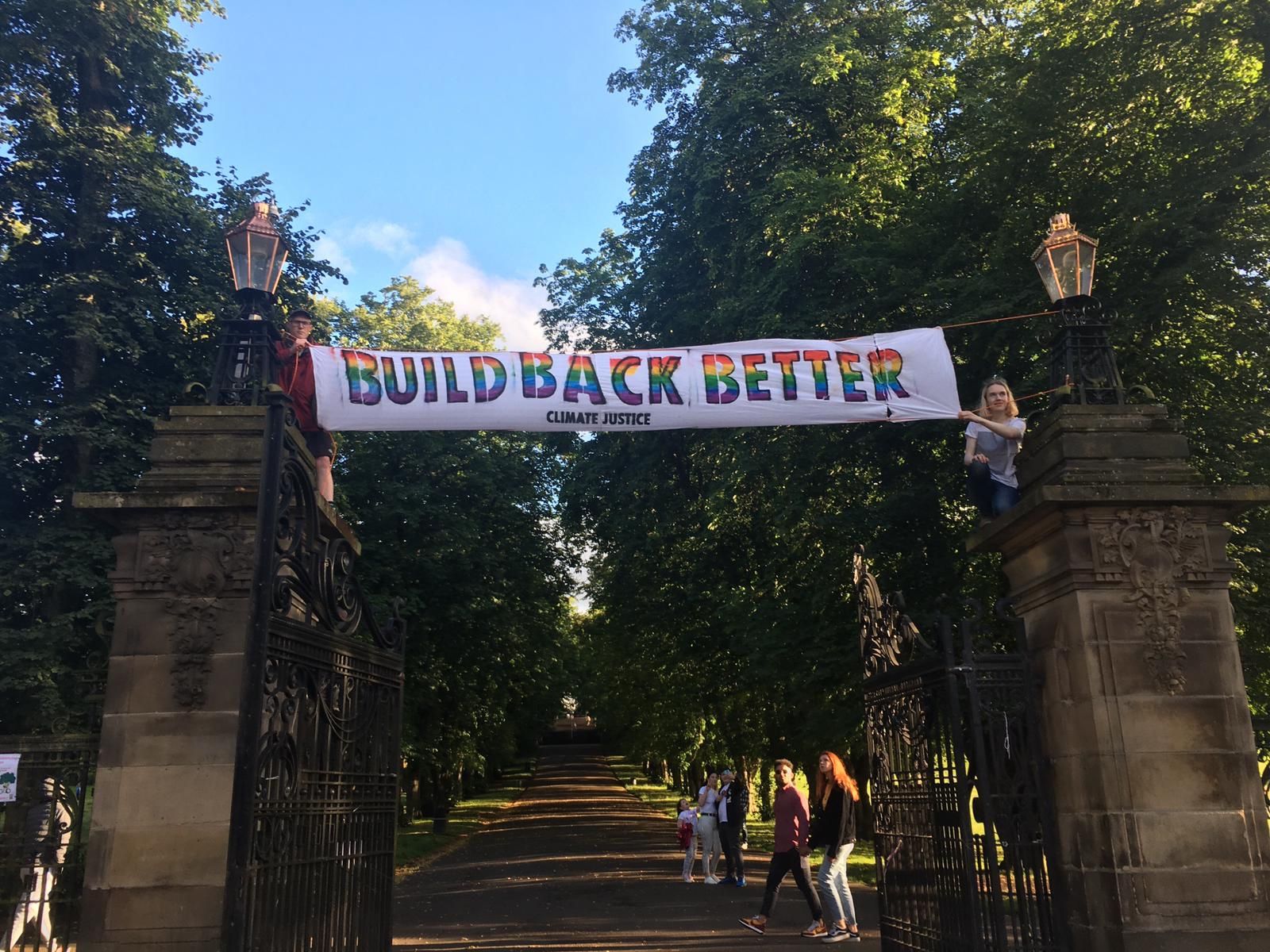
No going back – the fight for a just, green recovery
It’s been a hard year for so many people, but out of this has come the beginning of something better. Here’s a look back at the last few months and the growing movement for a Just and Green Recovery.
Very early on in the first lockdown, we quickly saw the unequal impacts of the pandemic and the lockdown on women, Black and minority ethnic people, disabled people, those on low incomes and in precarious work.
But we also saw incredible solidarity – mutual aid groups springing up across the country to care for neighbours, community kitchens delivering food parcels and huge appreciation for the important role of key workers. It was a wake up call for many and a chance to think about how we could – and must – do things differently.
We were also seeing that governments could make fast, bold choices to protect people when they chose. Previous ideas around what is politically possible where discarded almost overnight.
Inspired by calls for a just recovery around the world, we got together with a group of organisations in Scotland to build our vision of a fairer, greener future after covid and how we could get there.
A vision of a better future
At the end of May, over 80 groups and organisations sent a letter to the First Minister saying that “The recovery from Coronavirus is a rare chance to markedly accelerate the repurposing of government away from the prioritisation of economic growth and towards goals of wellbeing and sustainability, ending inequality and environmental destruction. This is a time for system change.”
Together, as the campaign for Just and Green Recovery Scotland, we set out 5 key areas for action:
- Provide essential public services for people, not profit.
- Protect marginalised people and those on low incomes by redistributing wealth.
- Provide new funds to transform our society and economy to meet Scotland’s Fair Share of climate emissions cuts and greatly enhance biodiversity.
- Strengthen democracy and human rights during these crises.
- Offer solidarity across borders by proactively supporting an international Coronavirus and climate emergency response
The First Minister responded, saying she wanted to build a “fairer, greener and more equal society” and we were invited to meet members of the Cabinet. But the plans subsequently published by the Scottish Government and their advisors didn’t grasp the scale of change needed for such a fundamental shift in the way that government, the economy and our society works.
Building people power
We know that to win change we can’t just talk to politicians, we have to change people’s minds and fundamentally shift the public mood so that politicians have no choice but to act.
We started building stronger connections between our issues – environment and economy organisations working together with housing and health groups, churches and trade unions – because all of our issues are connected, created by a society that puts profit above people’s needs and protecting the environment. We ran webinars, workshops and supported community conversations.
In June, people across Scotland joined an online rally to tell the First Minister that they didn’t want to go back to ‘normal’ with its devastating inequalities and worsening climate crisis. Sharing pictures across social media with signs saying ‘We need a recovery plan for people and planet’, ‘Build Back Better’ and ‘No return to business as usual’.
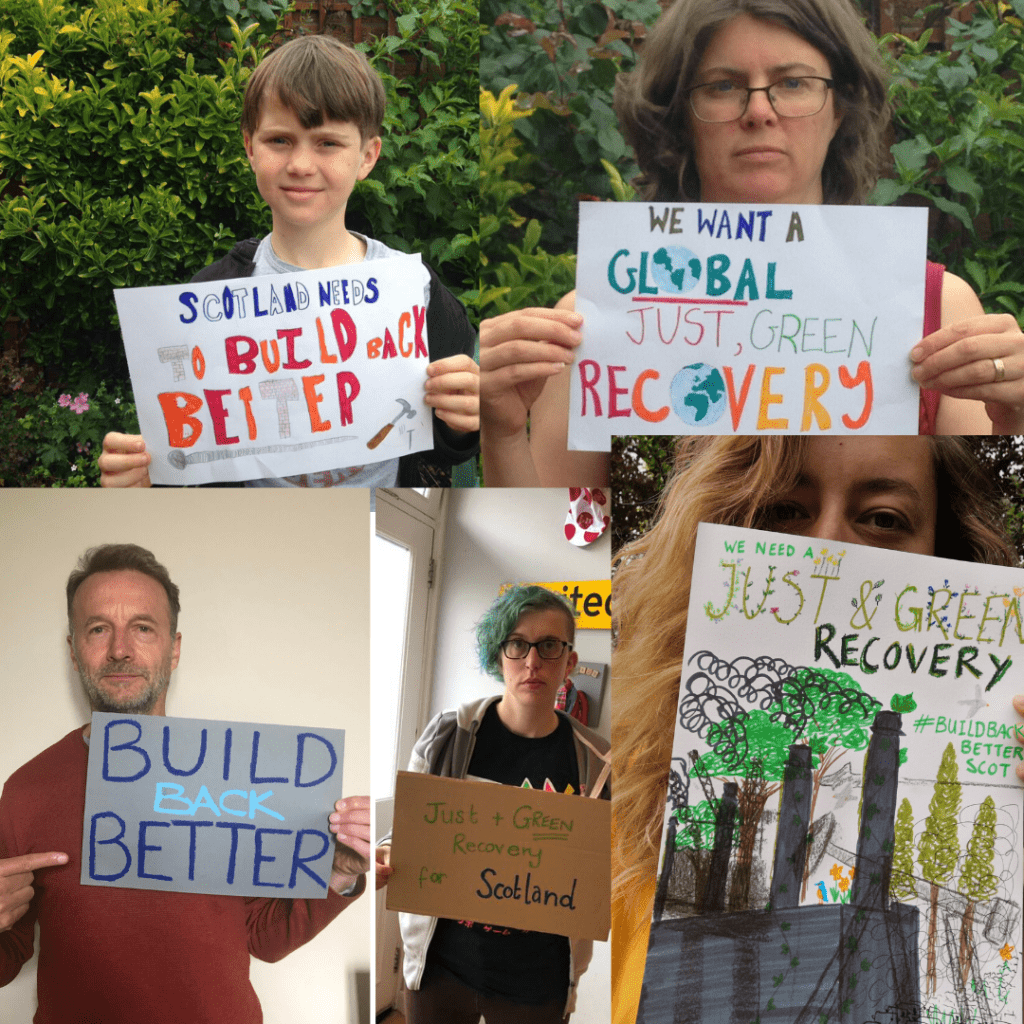
A group of key workers took their message directly to the Scottish Government’s headquarters in Edinburgh in a socially distanced protest, while young people – who will be particularly affected by unemployment – dropped banners across Scotland to get their message out.
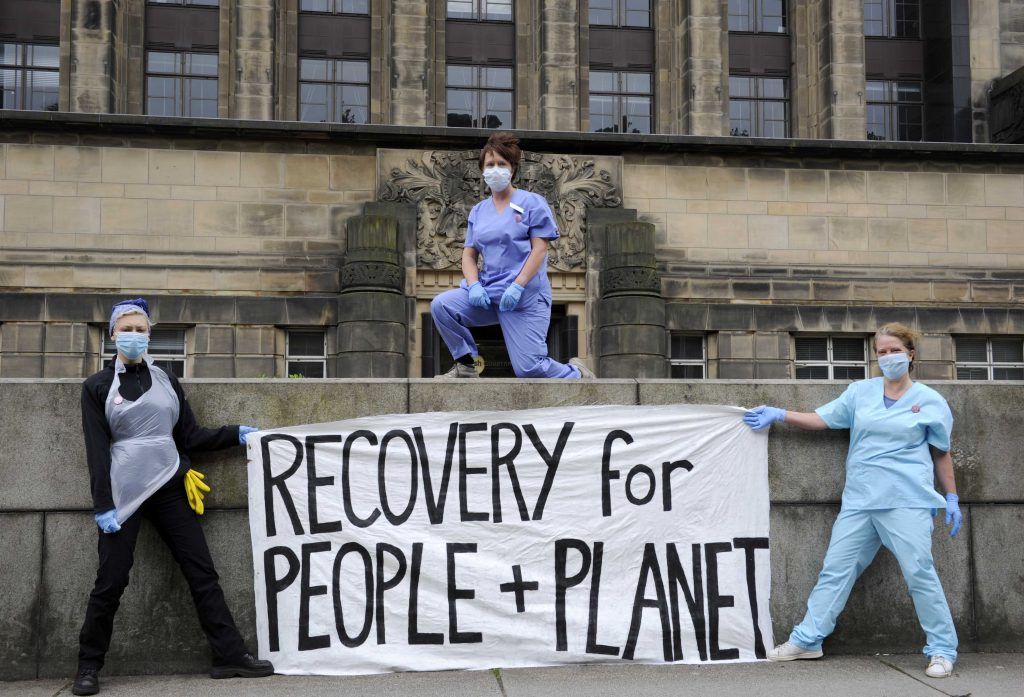
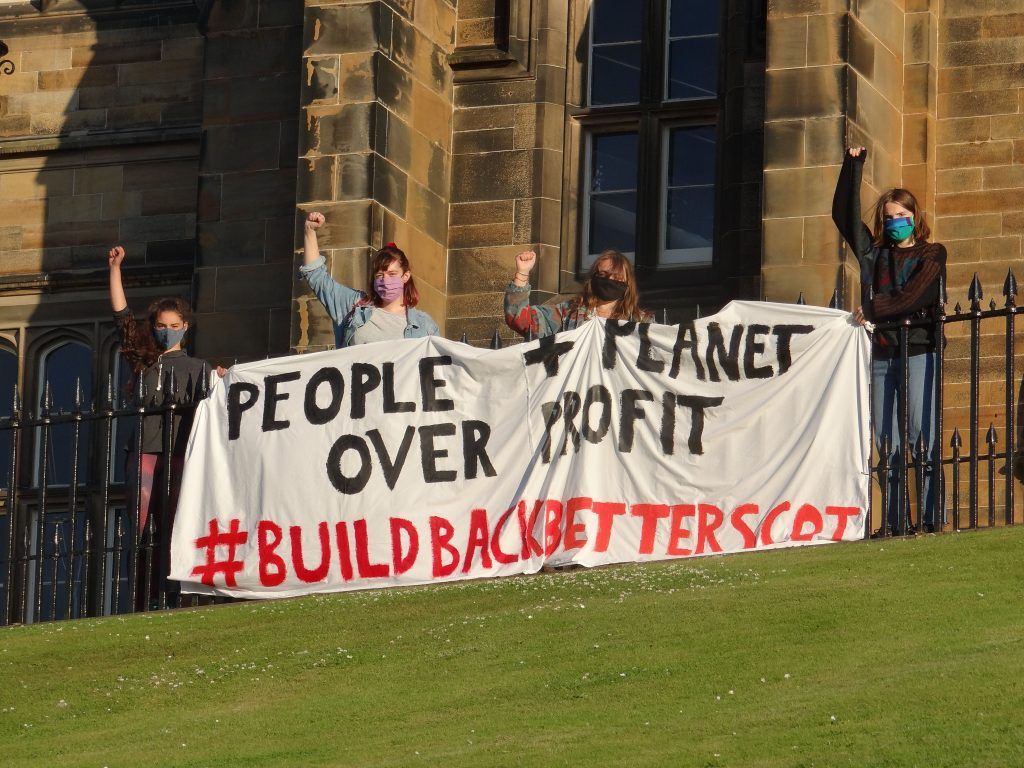
In November, we organised a Week of Action during which hundreds of people signed up to contact their MSPs and take part in a virtual lobby to share their experiences of this year, and their hopes and demands for the recovery.
Workers from the NHS, social care, hospitality, manufacturing and oil & gas came together to speak to politicians about the challenges they are facing and their demands for supporting workers.
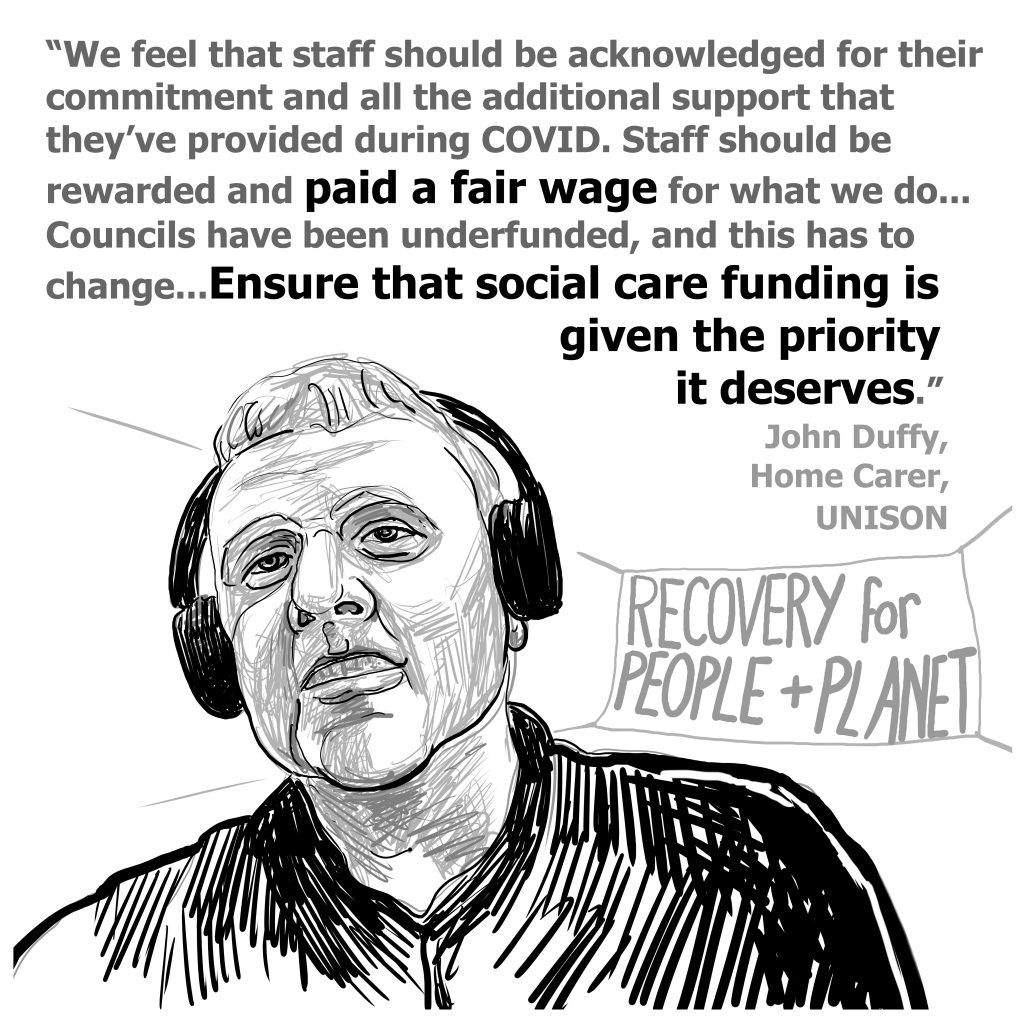

From Shetland to the borders, Edinburgh to the Outer Hebrides – communities are having conversations about the future they want, their local vision for a just and green recovery. Whether it’s thinking about green jobs in Wester Ross, communities around the polluting fossil fuel plant at Mossmorran calling for a just transition or care workers calling for a National Care Service, our movement is growing from the grassroots up.
Climate Action and Green Jobs
Friends of the Earth Scotland developed our plan for how climate action and green jobs could contribute to a just and green recovery – calling on the government to kickstart massive green job creation alongisde a programme of training and skills development, to make sure public recovery funds aren’t spent on polluting projects and to put the environment and people’s wellbeing at the heart of economy and government thinking.
We were pleased to see that the Scottish Parliament Environment, Climate Change and Land Reform Committee backed many of our recommendations in their recent green recovery report and we’ll be building on that next year.
Better things are ahead
The vaccine offers us hope that in the months to come we can be with our friends and family again. It also means that our governments can turn their attention from managing the virus to planning the recovery.
In the New Year, both the UK & Scottish Governments will announce their budget and spending plans – we need a stimulus package to create good green jobs. Money must go to public services – not more outsourcing to friends in the private sector who, as we’ve seen with track and trace, run services for profit and not for the best interests of all of us.
We must continue to fight for the vaccines to be made available around the world – not stockpiled by rich countries. And with COP26 coming to Glasgow in 2021, we will keep pushing the government for an international climate justice response.
And with the Scottish Parliament elections in May, the pressure is on all parties to show how they will tackle the crises of climate change, unemployment and inequalities to build back better.
Great change is not made overnight, but if we continue to work together, connect our issues, learn from each other and build our movement we can win a better future.
If you’re interested in learning more about getting active on climate campaigns, check out our new Introduction to Campaigning short course beginning in January 2021. This will help you take your first steps, learn the basic and build skills alongside other people who want to get active.
